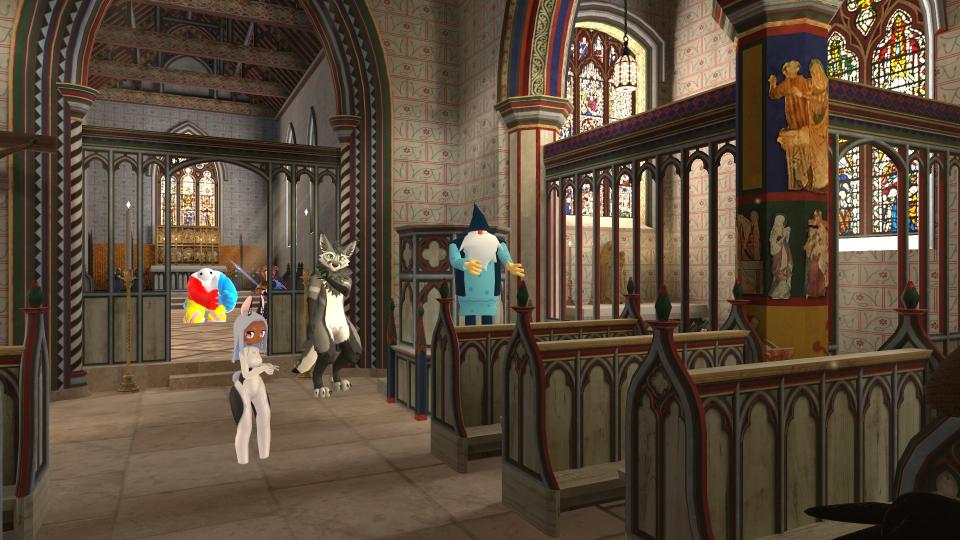Information for Students

Course field trip in the metaverse for INT 137RT: Religion and Technology
Arnhold Summer Courses allow students to explore compelling topics from multiple perspectives and apply their knowledge through hands-on, project-based experiences. Students work closely with course instructors and TAs to discuss different ways that scholars approach concepts like utopia, religion, time, and more. Arnhold Summer Courses offer one-of-a-kind learning experiences by challenging students to think through making and doing, such as thinking about utopia through writing short stories, learning about religion and technology in the metaverse, relating to Shakespeare through helping rehearse a live theatrical production, and many more.
Scholarships
Arnhold Summer Courses offer competitive scholarships to offset the cost of summer courses. For more information about how to apply for a scholarship, please visit Summer Sessions’ website or contact Summer Sessions directly.
Now Enrolling Summer 2025!
Summer Session A 2025
Kara Mae Brown (Writing; College of Creative Studies) and Victoria Houser (Writing)
5.0 Credits
Course description:
Storytelling is an important technique across the arts and humanities. For rhetoricians, stories provide avenues to raise awareness, persuade audiences, and provide counter histories to dominant narratives. For creative writers, storytelling is the very vehicle for their art. And, of course, art is rhetoric and rhetoric can be art. In this class, students will study many different dimensions of time, read scholarly and creative texts about different concepts of time, and construct their own narratives that use time as a creative or rhetorical tool.
Summer Session B 2025
Irwin Appel (Theater & Dance) and Jim Kearney (English)
8.0 Credits
This course brings together two faculty, English Professor James Kearney and Theater & Dance Professor Irwin Appel, to offer students an immersive experience of Shakespeare that combines performance, literary study, and research. Students can expect Shakespeare to come to life on page and stage as they experience these multifaceted plays from a variety of perspectives.
Brad Bouley (History) and Patrick McHugh (Writing)
5.0 Credits
The dream of a perfect society, in which all residents would live in harmony with certain ideals, has animated politicians and the public from mythical Atlantis to the 1,100 “intentional communities” currently thriving in the United States. But perfection has its dark side and utopian dreamers have included colonizing bishops in the Americas, the Cambodian dictator Pol Pot, and the Russian strongman Joseph Stalin. This course will examine the utopian dream through history, literature, philosophy, and public memory. Starting with a historical and philosophical background of the concepts and unintended consequences of idealism, the course will then turn to focus more narrowly on our own planned community of Isla Vista. Students will engage with public history and memory to trace the ideals and the reality that have animated and continue to impact our surrounding community. Finally, in the last part of the survey, students will look at the future, focusing first on fictional accounts of utopia and dystopias, before writing their own speculative fiction as a final project.
Amanda Stansell (Writing) and Alexandra Phillips (Bren)
5.0 Credits
Students will create three engaging ~800 word articles on local climate change actions that will be considered for publication in Blue Dot Magazine. Steps toward the article will include: learning the latest climate science, pitching to Blue Dot Magazine, and supporting an article with photography and social media publicity.
Michelle Grue Petty (Writing and College of Creative Studies) and Iman Djouini (Art and College of Creative Studies)
5.0 Credits
In a time where history seems to be repeating itself, and forces across the nation are making a concerted effort to obscure history and dismantle programs trying to teach a full historical narrative, it is all the more important for students to have the opportunity to look at primary historical sources and make their own sense of them. Drawing inspiration from Fred Wilson’s impactful exhibit “Mining the Museum,” students will work with Profs. Petty and Djouini to do their own mining of the museum, using UCSB’s archives and other national and international digital museum collections to bring attention to often overlooked and sometimes deliberately hidden artifacts of history. They will search archives and museum collections to find an item and write about its connection to them, history, and today. Those one-page responses, in prose or poetry, will be designed with consideration of typeface, color, layered imagery, and symbolic motifs. They will be bound into an archival book, which will be distributed to students at the end of the course.
Questions?
Contact Dr. Nicole Strobel, Arnhold Arts and Humanities Coordinator (nstrobel@ucsb.edu).